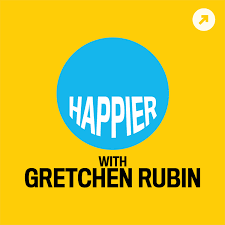Recommendation: Happier Podcast

I was talking to my friend Nick about how to change up my blog so it isn’t always just me talking about myself (I mean, I know that’s kind of what a blog is, but they say variety is the spice of life), and he suggested that I share recommendations for books, podcasts, things that I think are great. Seemed like a good idea, so here goes.
I’ve gotten into podcasts over the last few years and have found a nice variety, mostly coming from recommendations by friends. I’ve got a few political podcasts (The 45th, Stay Tuned with Preet), a bunch of murder mystery/true crime podcasts (Serial, Undisclosed, S-Town, In the Dark, Up and Vanished), a couple of lifestyle podcasts (Weight Loss for Busy Physicians, Happier Podcast), and one totally frivolous podcast called Here to Make Friends that I will describe a bit later in this blog.
Happier Podcast was recommended to me by my friend Adriane. I was pretty skeptical at first, as I knew that the podcast’s host Gretchen Rubin was the author of a book called The Happiness Project and also had been a regular Oprah Magazine columnist, writing about happiness. I was afraid it would be full of trite, eyeroll-worthy advice, but I figured that successful Adriane has pretty high standards and wouldn’t spend her time on fluff, so I gave it a try and ended up loving it.
Happier Podcast is co-hosted by “happiness guru” Gretchen Rubin and her sister, L.A.-based writer/producer Elizabeth Craft. The dynamic between the two is really enjoyable, with Gretchen being more Type A analytical and Elizabeth being more laid back and sarcastic. The podcast’s purpose is to dive into the habits that lead to a happier life, and I find that it’s full of practical, research-based advice. I like that Gretchen and Elizabeth often have differing approaches to the advice, however, which gives the advice some nuance and depth. The podcast also uses as its foundation Gretchen’s Four Tendencies framework, which divides personality types into the following four categories: Upholder, Obliger, Questioner (that’s me), and Rebel. Recognizing that people have different approaches to the world and to the way in which habits are created and maintained allows their happiness advice to be tailored according to an individual’s “tendency.” I will save the Four Tendencies framework for another blog post, but an understanding of the “tendencies” runs through many of the podcast episodes.
Habits of happiness addressed in the podcast have included being a tourist in your own city, engaging in a “Power Hour” to get onerous chores done, finding and imitating a spiritual master, picking a “one-word” theme for the year, and many more. They also assign themselves happiness “gold stars” and “demerits” each episode as they look at their own lives and find ways in which their happiness has been supported and challenged. I have come away with a few delightful life improvements thanks to Happier Podcast, including the purchase of a hard-boiled egg maker; an embarrassing-yet-delicious podcast dedicated to the Bachelor franchise called Here to Make Friends (yes, I watch every Bachelor and Bachelor-adjacent show out there); and an understanding that I am a Questioner, which helps me understand myself and my motivations better.
I’ll listen to podcasts while I get ready in the morning, while I drive to and from work, and then twice a week I try and make myself get up before work and spend thirty minutes on the elliptical machine. While I do, I always listen to Happier Podcast. It’s a positive, upbeat way to spend a half hour at the beginning of the day, and I always end up feeling happier– so I guess the podcast works!
